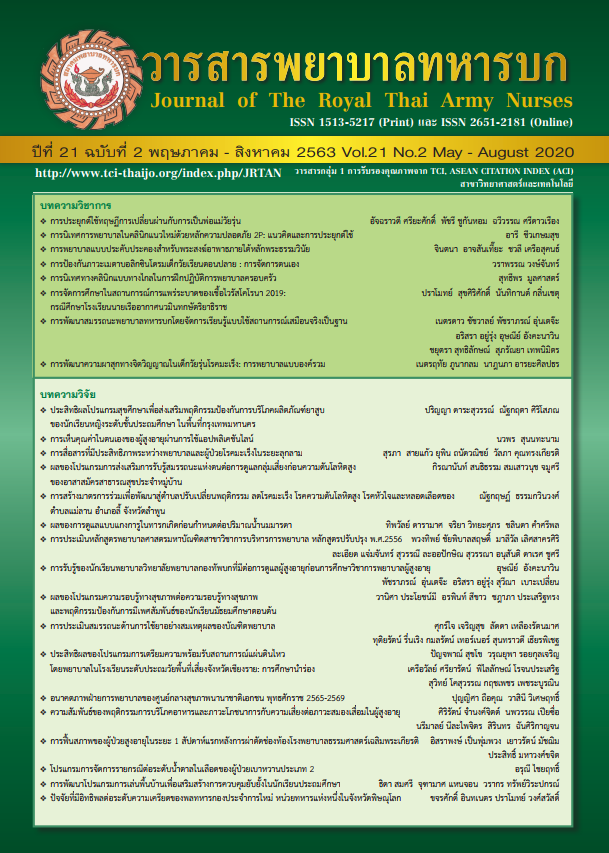The Enhancement of Prisoner’s Family Adaptation through Assimilative Integration Family Counseling Based on Structural Family Counseling Theory
Keywords:
Family adaptation, Prisoners, Assimilative integration family counselingAbstract
The purpose of this research was to study the component of family adaptation and develop format of family adaptation. It was divided into 2 steps. The first step studied confirmed element of family adaptation and the second step was family counseling to enhance family adaptation. The samples were wife and son or daughter of prisoner who was imprisoned less than 1 year with the lowest family adaptation scores. Twenty families were performed simple random sampling into the experimental and control group. The instruments were family adaptation measurement and 10 sessions of assimilative integration family counseling based on structural family counseling theory which developed by the researcher. The confirmatory factor analyses, the multivariate analysis of variance with repeated measures were used for analyzing the data.
The results revealed that 1) The component of family adaptation were family function, family relationship, social relationship, and readiness to solve problem. 2) The mean score of family of the experimental group after intervention and after 4 months was higher than those in the control group statistically significant different at .05 level.
Downloads
References
2. Trangkasombat U. Family therapy and family counseling. (6th ed.). Bangkok. Sunta Publisher. 2011. (in thai)
3. Wongprach B. Factors Related to Stress and Coping Stress of Nursing Students in The Royal Thai Army Nursing College. Journal of the Royal Thai Army Nurses. 2018; 19(2): 201-210. (in thai)
4. Homlaor S. Ar-yor Kaenor Aeka (Father arrested) 2nd ed. Bangkok: Merge culture Founding Printing. 2009.
5. Uratanamanee S, Wacharasin C, Karuhadej P. The Adaptation of Single Father Families : The Life Experience of Single Fathers. Journal of the Royal Thai Army Nurses. 2016; 17(3): 217-225. (in thai)
6. Kumsuwan K, Chocktanakul in Wajanasara K., Achawanitkul K. Editors. Marginal Population and Fairness in Thai Society. Bangkok. Deuntula Publisher. 2012;319-340. (in thai)
7. McCubbin, H. I., & Patterson, J. M.. Family stress and adaptation to crises: A Double ABCX Model of family behavior. In D. H. Olson & R. C. Miller (Eds.), Family studies review yearbook: Vol. Beverly Hills, CA: Sage. 1983; 1:87–106.
8. Kulnapadol P. Family Counseling. 2nded. Bangkok: Ham compute offset; 2014. (in thai)
9. Goldenberg, H. & Goldenberg, I. Family Therapy: An overview (7thed.). Canada:Thomson Brooks/ Cole. 2008.
10. Kulnapadol P. Structural Family Counseling: Sustainable Family Development. Strategies. Journal of Education. 28(2) 2012;25-32.( in thai)
11. McCubbin H.I. & Patterson A.I. The T-Double ABCX Model of family adjustment. In Mc Cubbin, H.I., and A.I. Tompson (Eds.). Family assessment inventories of research and practice. Madison WI: University of Wisconsin-Madison 1987:3-32.
12. Khomkham K, Rattanathanya D, Krinuwat K. Predictive Factors for Adaptation Among Caregivers of Stroke Patients. Journal of the Royal Thai Army Nurses. 2015; 16(2):114-122. (in thai)
13. Kerdpitak P. Concepts of Guidance and Theories in Psychogical Counseling. Nonthaburi. Sukothai Thammathirat Open University Publisher; 2011. (in thai)
14. Minuchin S. Salvador Minuchin on Family Therapy with Salvador Minuchin. Psychotherapy.net, LLC. 2011.
15. Thammarux T., Chanruangvanich W., Thosingha O., Aurboonyawat T., Impact of a FamilyEmpowering Programme on the Coping Ability of the Family Caregivers of Postoperative Neurosurgical Patients in a Neurosurgical ICU. Thai Journal of Nursing Council. 2017;32(2): 49-64. (in thai)
16. Sotthiyapai S., Damsangsawat N., Sirathatnararojana T., Family Counseling Model. The Southern College Network Journal of Nursing and Public Health. 2017; 4(3): 282-290. (in thai)
17. Kinachai C., Deoisres W. Family Intervention Program Family Adaptation Cerebrovascular Disease Patients after Discharge from the Hospital. Journal of Nursing and Health Care. 2017;35(3):138-144.
Downloads
Published
How to Cite
Issue
Section
License
บทความหรือข้อคิดเห็นใดใดที่ปรากฏในวารสารพยาบาลทหารบกเป็นวรรณกรรมของผู้เขียน ซึ่งบรรณาธิการหรือสมาคมพยาบาลทหารบก ไม่จำเป็นต้องเห็นด้วย
บทความที่ได้รับการตีพิมพ์เป็นลิขสิทธิ์ของวารสารพยาบาลทหารบก
The ideas and opinions expressed in the Journal of The Royal Thai Army Nurses are those of the authors and not necessarily those
of the editor or Royal Thai Army Nurses Association.






